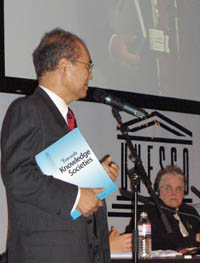UNESCO welcomes endorsement of freedom of expression, cultural diversity and access to information at WSIS
21-11-2005 (Paris)

On 18 November, the Director-General of UNESCO, Koïchiro Matsuura, welcomed the endorsement by 176 States attending the World Summit on the Information Society (Tunis, November 16-18) of UNESCO’s vision of “knowledge societies”.
This vision is based on the four principles of freedom of expression, quality education for all, universal access to information and knowledge and respect for cultural and linguistic diversity.
These principles are included in the Tunis Commitment and the Tunis Agenda for the Information Society adopted at WSIS today. The Tunis Commitment (paragraph 4) recognizes that freedom of expression and the free flow of information, ideas and knowledge are essential for the information society and development. In paragraph 9, the Commitment recognizes the capital importance of access to information, respect for cultural and linguistic diversity and for the role of the media to “ensure that everyone can benefit from the opportunities that ICTs can offer.” Paragraph 11 highlights “the enormous potential ICTs have to expand access to quality education, to boost literacy and universal primary education.”
The Tunis Agenda recommends that UNESCO continue playing a leading role in implementing the Plan of Action adopted during the first phase of the Summit, in Geneva in December 2003. The Agenda invites UNESCO’s contribution in the following eight areas: access to information and knowledge; capacity building; e-learning; e-science; cultural and linguistic diversity and open content; media; ethical dimensions of the information society; international and regional cooperation.
Speaking at the Plenary session of WSIS, the Director-General of UNESCO pleaded in favour of “equitable and inclusive knowledge societies [that] harness the potential of knowledge and put it at the service of sustainable development. For UNESCO, building knowledge societies is about building a better future for all nations and peoples,” he said. In his address, Mr Matsuura also highlighted the importance of a multi-stake holder approach that includes civil society and the private sector in implementing the WSIS Plan of Action.
(Source: UNESCO Press Release No. 2005-139)
These principles are included in the Tunis Commitment and the Tunis Agenda for the Information Society adopted at WSIS today. The Tunis Commitment (paragraph 4) recognizes that freedom of expression and the free flow of information, ideas and knowledge are essential for the information society and development. In paragraph 9, the Commitment recognizes the capital importance of access to information, respect for cultural and linguistic diversity and for the role of the media to “ensure that everyone can benefit from the opportunities that ICTs can offer.” Paragraph 11 highlights “the enormous potential ICTs have to expand access to quality education, to boost literacy and universal primary education.”
The Tunis Agenda recommends that UNESCO continue playing a leading role in implementing the Plan of Action adopted during the first phase of the Summit, in Geneva in December 2003. The Agenda invites UNESCO’s contribution in the following eight areas: access to information and knowledge; capacity building; e-learning; e-science; cultural and linguistic diversity and open content; media; ethical dimensions of the information society; international and regional cooperation.
Speaking at the Plenary session of WSIS, the Director-General of UNESCO pleaded in favour of “equitable and inclusive knowledge societies [that] harness the potential of knowledge and put it at the service of sustainable development. For UNESCO, building knowledge societies is about building a better future for all nations and peoples,” he said. In his address, Mr Matsuura also highlighted the importance of a multi-stake holder approach that includes civil society and the private sector in implementing the WSIS Plan of Action.
(Source: UNESCO Press Release No. 2005-139)
Related themes/countries
· UNESCO at WSIS in Tunis
· Tunisia: News Archives 2005
· News Archives 2005
Share this story:
Contact information
- UNESCO
Source














